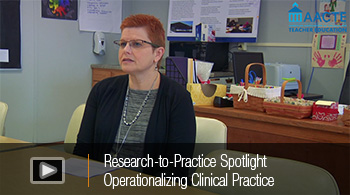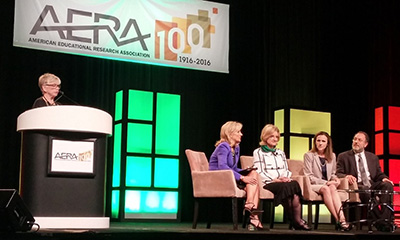02 May2016
By Kristin McCabe
For new or prospective deans and department chairs, there’s no better place to get up to speed than AACTE’s Leadership Academy, June 26-30 in Portland, Oregon.
Have you ever puzzled over the relationship between a dean and a department chair? Struggled to organize an effective meeting or to get your message across to higher administration? Wondered how to approach persistent dilemmas or deal with difficult people? These are just some of the topics that past attendees say provided valuable lessons during the Leadership Academy.
“It was very beneficial to listen to others’ experiences and solutions to our similar challenges,” one participant wrote. “These ideas will help me be more efficient and celebrate faculty more.”
02 May2016
By Aaron Goldstein
Ed Prep Matters is pleased to bring you this special feature on state policy and AACTE state chapter activity. For a summary of March’s state activity, see this article; February’s state activity is available here.
Overview of State Policy Activity
Thanks to AACTE’s State Policy Tracker, we can identify trends in state legislation and regulations related to educator preparation.
So far this year, approximately 300 state bills related to educator preparation have been introduced. Of these, 186 were related to certification and standards, and 18 have been enacted. Many of these laws are related to lowering certification standards for alternative-route programs, differentiated licensure standards for certain subjects including STEM fields and career and technical education (CTE), and allowing more pathways into teaching to alleviate shortages. Seven bills related to teacher certification and shortages have been signed into law in 2016 with themes such as expanding scholarships for teacher candidates and offering loan forgiveness for teachers. Five state bills have been signed into law related to teacher licensure standards.
02 May2016
By Kristin McCabe
 AACTE joins the National Education Association (NEA) and the National Parent Teacher Association (PTA) in celebrating terrific teachers during National Teacher Appreciation Week, May 2-6, and National Teacher Day, May 3.
AACTE joins the National Education Association (NEA) and the National Parent Teacher Association (PTA) in celebrating terrific teachers during National Teacher Appreciation Week, May 2-6, and National Teacher Day, May 3.
Tune in to the White House tomorrow as President Obama recognizes this year’s national and state teachers of the year, and don’t forget to reach out to congratulate any honorees who are alumni of your programs!
How can you get involved in the teacher celebration? In addition to holding events for your alumni or simply thanking teachers in person, here are some easy ways to engage on social media:
26 Apr2016
By Deborah Koolbeck
It is time again to make your voice heard in the latest request for comments on the U.S. Department of Education’s proposed regulations on teacher preparation programs. The deadline to submit comments is Monday, May 2.
On April 1, the Department released a supplemental notice of proposed rule making (NPRM) affecting the implementation of the proposed teacher preparation program regulations for “distance education” programs. The Department seeks additional feedback on questions raised about these programs in some of the nearly 5,000 comments received on the initial NPRM last year.
AACTE stands ready to help you respond to this request for comment!
26 Apr2016
By Amanda Lester
The AACTE Clinical Practice Commission (CPC) was launched in June 2015 with the goals of establishing a shared lexicon, identifying model protocols and best practices, and developing actionable recommendations for the field to define and align high-quality clinical practice in teacher preparation. The commission’s work is projected to extend through December 2016, but the 68th AACTE Annual Meeting held in February provided an opportunity to share the group’s work to date and gather feedback from the field.
During the conference, members of the CPC presented their vision for clinical practice, built upon a foundation of strong PK-24 partnerships and centered on transforming educator preparation by unifying the profession. Several commissioners provided insight into the CPC’s work as presenters during the preconference event “Preparing Tomorrow’s Leaders Through School-University Partnerships,” sponsored by the Wallace Foundation, and as featured panelists in the major forum “Clinical Practice in Educator Preparation.”
Three members of the CPC, Kristien Zenkov and Audra Parker from George Mason University (VA) and Rene Roselle from the University of Connecticut, spoke at the preconference event. Their presentation summarized the commission’s progress toward developing a white paper and a shared lexicon to connect the essential elements of clinical partnerships. They also discussed the common structures of clinical preparation and the implications that clinical teacher preparation has for advancing clinical practice in principal preparation.
26 Apr2016
By Matthew Wales
 Are you a new dean or department chair—or simply looking to advance your career as an academic administrator? Get ahead at AACTE’s Leadership Academy this June in Portland, Oregon!
Are you a new dean or department chair—or simply looking to advance your career as an academic administrator? Get ahead at AACTE’s Leadership Academy this June in Portland, Oregon!
AACTE’s Leadership Academy is held each summer as a professional development training for new deans, department chairs, and other academic administrators. The academy covers the essentials of leadership, from managing finite resources to effective development and public relations, while helping attendees cultivate a supportive network of peers.
25 Apr2016
By Aaron Goldstein
 Last week, I hosted a webinar demonstrating the AACTE State Policy Tracker, an online tool that provides an interactive and user-friendly way for member institutions and state chapters to be more informed on state legislation and regulations related to educator preparation.
Last week, I hosted a webinar demonstrating the AACTE State Policy Tracker, an online tool that provides an interactive and user-friendly way for member institutions and state chapters to be more informed on state legislation and regulations related to educator preparation.
The webinar’s video recording and presentation slides are now available here.
If you have any questions or would like to learn more about the online policy tracker, contact me at agoldstein@aacte.org or (202) 478-4504.
25 Apr2016
By AACTE
 A set of principles released this month gives educators and policy makers new guidance on the secure and ethical use of video and other classroom materials gathered as part of preservice teacher preparation. A task force of educators led by AACTE created the principles to ensure the privacy of those whose images and work are captured in the performance assessment of aspiring teachers.
A set of principles released this month gives educators and policy makers new guidance on the secure and ethical use of video and other classroom materials gathered as part of preservice teacher preparation. A task force of educators led by AACTE created the principles to ensure the privacy of those whose images and work are captured in the performance assessment of aspiring teachers.
The 27-member task force began convening last fall, meeting several times to develop the principles and supporting documents. Their brief brochure, “Securing Personal Information in Performance Assessment of Teacher Candidates,” explains the importance of videos and other artifacts in teacher performance assessment and introduces nine principles to guide those involved in creating or reviewing materials that include student images or identifying information.
25 Apr2016
By Sungti Hsu
AACTE is proud to support two daylong colloquia at the annual conference of NAFSA: Association of International Educators in Denver, Colorado, May 31 and June 3.
On Tuesday, May 31, the Global Learning Colloquium on Teacher Education will focus on the theme “High-Impact Global Learning Experiences and Curricular Design.” The program runs 9:00 a.m.–3:00 p.m. and will address how to prepare preservice teachers to work with diverse populations, understand how their practice affects both local and global communities, and be culturally responsive in pedagogy and curriculum choices. Participants will hear from global education organizations as well as from teacher educators from California State University, Kent State University (OH), Southern Connecticut State University, the University of Connecticut, the University of Missouri, and the University of Nevada-Reno.
19 Apr2016
By Jerrica Thurman
Please join educators from Georgia in an interactive webinar where they will share how they incorporated professional ethics training and assessments in their curriculum and used the resulting data to inform program improvements.
Preparing Preservice Educators in Ethical Decision Making Using Innovative Strategies
Tuesday, April 26, 2016, 11:00 a.m. – 12:00 p.m. EDT
Presenters:
- Anne Marie Fenton, Director, Assessment, Georgia Professional Standards Commission
- Sarah Hallstein, Teacher, Glenwood Primary School, Rome, Georgia
- Edward Hill, Dean and Associate Professor, College of Education, Fort Valley State University
- Troy Hutchings, Senior Strategic Advisor – Educator Ethics, Educational Testing Service
- Jack Parish, Associate Dean, Outreach and Engagement, College of Education, University of Georgia
- Francis Roe, Director of Field Experiences and Clinical Practice, Charter School of Education and Human Sciences, Berry College
- Paul Shaw, Division Director, Ethics, Georgia Professional Standards Commission
Hear from these industry leaders as they walk you through their state’s work, in collaboration with Educational Testing Service, to deploy innovative strategies to prepare their state’s candidates in educator ethics.
19 Apr2016
By Deborah Koolbeck
Did you miss my webinar last week on the U.S. Department of Education’s latest action on the proposed regulations for teacher preparation programs? Don’t worry—you can view the archived slides and webinar recording online. You’ll get an overview of the supplemental notice of proposed rule making (NPRM) released April 1, along with some of the concerns and unintended consequences that could unfold. The webinar also reviews how to submit to the Federal Register.
In addition, we have posted a template letter for you to personalize and submit in response to the request for comment from the Department by the May 2 deadline.
18 Apr2016
By Rod Jonas
The North Dakota Association of Colleges for Teacher Education (NDACTE) received an AACTE State Chapter Support Grant last year to assist with the development and administration of a set of common assessments to be used by all North Dakota teacher preparation programs to improve the effectiveness of programs and quality of graduates.
During this school year, members of NDACTE have engaged in meetings and training workshops to learn how to effectively implement four common assessments: the Preservice Teacher Exit Survey, the Transition to Teaching Survey, the Supervisor Survey, and the Preservice Teacher Observational Assessment.
18 Apr2016
By Rodrick Lucero
 It is my pleasure to introduce the Patton College of Education at Ohio University as the next institution to be featured in AACTE’s Research-to-Practice Spotlight Series. Continuing our focus on effective models of clinical practice, this series highlights the award-winning work of Ohio University’s Patton College and its network of PK-12 partner schools to continuously improve their preparation of teachers in an active interchange of theory and practice.
It is my pleasure to introduce the Patton College of Education at Ohio University as the next institution to be featured in AACTE’s Research-to-Practice Spotlight Series. Continuing our focus on effective models of clinical practice, this series highlights the award-winning work of Ohio University’s Patton College and its network of PK-12 partner schools to continuously improve their preparation of teachers in an active interchange of theory and practice.
Over the next few weeks, we’ll be posting videos and blog articles to share what AACTE staff learned during our recent visit to picturesque Athens, Ohio, where we met with a broad selection of program leaders and participants. It was clear that the clinical practice model resonates with candidates, mentor teachers, PK-12 administrators, and those on the campus because those involved can see the benefits and have a clear understanding of the processes supporting them. The tone of this partnership is one of infinite possibility as all members of the community find themselves involved.
To help introduce this series, I invited Patton College Dean Renée Middleton to reflect on the program’s success and development. Here’s what she had to say:
18 Apr2016
By Shelly Meyers
It is no secret that South Carolina has faced many challenges related to education. Most recently, a shortage of teachers has been severely affecting the most vulnerable regions of South Carolina: our rural and poverty-stricken regions. In a state where most students live below the poverty level, there are some unsung heroes doing their best with the lowest of means, but we desperately need to improve our recruitment and retention of professional educators.
One way the state is supporting this goal is through Proviso 1A.73, also known as the Rural Teacher Recruiting Incentive. The FY16 budget allows for $1.5 million to be spent on this plan. The Center for Educator Recruitment, Retention, and Advancement (CERRA) at Winthrop University along with the South Carolina Department of Education and the Education Oversight Committee has been charged with the responsibility to develop the initiative, and CERRA Executive Director Jane Turner submitted the plan for the first year in January 2016 with multiple components:
18 Apr2016
By Zachary VanHouten

From left to right: Jeannie Oakes, University of California – Los Angeles; Second Lady Dr. Jill Biden; Mary Keller, Military Child Education Coalition; Catherine Bradshaw, University of Virginia; Ron Avi Astor, University of Southern California
During the American Education Research Association (AERA) 2016 annual meeting last week, Second Lady Dr. Jill Biden was a featured panelist in a session on military-connected students in PK-12 schools. Stressing the need for more research and additional support for these students, Biden reflected on her visits with military families around the world and the commonly overlooked needs of military-connected students.
Other panelists discussed their research on military-connected students as well as the need to ensure teachers are prepared to address the needs of these students. Mary Keller, president and CEO of the Military Child Education Coalition, joined Biden in discussing some of the transformative work that colleges of education have embarked on through the Operation Educate the Educators partnership with AACTE to ensure teachers are prepared to meet the needs of military-connected students.







 AACTE joins the
AACTE joins the 


